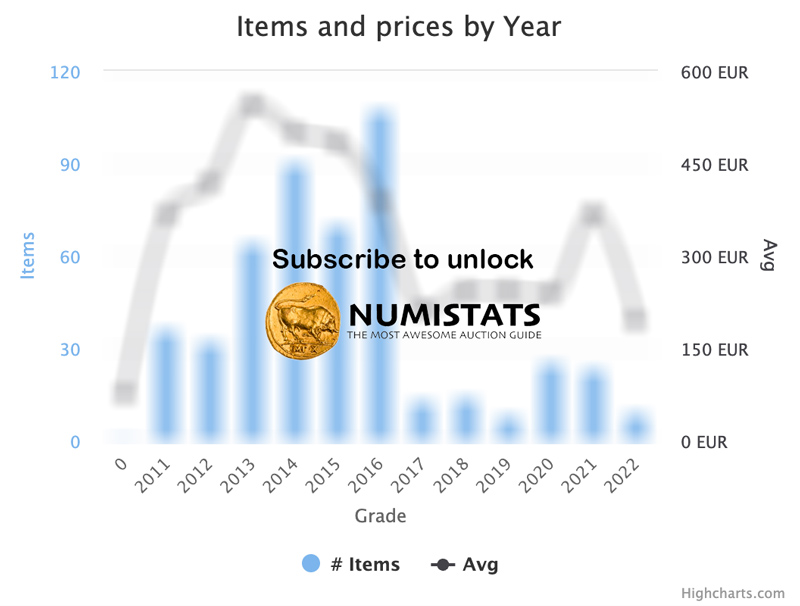Classical Numismatic Group, LLC - Triton XXVIII – Sessions 1-4 . 788 Numistats ref: 673277

Magnentius
Autoridad
Solidus
Denominación
-
Año
RIC ric.8.tri.247
RIC 247
Referencias
Roman Imperial
Categoria
Magnentius. AD 350-353. AV Solidus (21.5mm, 4.63 g, 6h). Treveri (Trier) mint. 1st emission, 18 January-27 February AD 350 . IM CAE MAGN ENTIVS AVG, bareheaded, draped, and cuirassed bust right / VICTORIA ‘ AVG ‘ LIB ‘ ROMANOR, Victory, draped, cradling palm frond in left arm, standing right, and Libertas, draped, holding transverse vindicta in left hand, standing left, both draped and together holding a trophy set on long staff between them with their right hands; TR. RIC VIII 247; Bastien 7; Depeyrot 8/1; Biaggi 2197; Mazzini 46v. Toned, with some luster, minor scratches and marks. Good VF.
From the Ramrodivs Collection. Ex Berk BBS 185 (9 July 2013), lot 32.
Born around A.D. 303 to a British father and Frankish mother, Flavius Magnus Magnentius showed enough talent to rise high in the Roman army. In the 340s, the western emperor Constans appointed Magnentius as commander in his personal guard. Whatever Magnentius’ merits, gratitude was not among them, for in January AD 350, he staged a successful coup deposing his benefactor. Constans, who had made himself unpopular with the army, attempted to flee to his brother Constantius II, emperor of the East, but was captured and executed. After securing control of Italy, Magnentius attempted to negotiate with Constantius, but the eastern emperor would hear none of it. Taking a year to marshal his forces, Constantius struck in the summer of AD 351, but Magnentius defeated his initial thrust into Italy and went on the offensive, seizing the strategic town of Siscia and forcing a major engagement in the Balkans. The clash at Mursa on September 28, AD 351 proved one of the costliest battles in Roman history, leaving the ground strewn with 55,000 dead. Magnentius fared much the worse and retreated into Gaul. Constantius took his time in pursuit, invading Italy the following year and methodically tightening the noose around Magentius, who was forced to take refuge in the city of Lugdunum. Rather than surrender, Magnentius fell on his sword in August of AD 353. Although a usurper, Magentius had a long-lasting impact on the Roman Empire through the agency of his young widow, Justina, who later married Valentinian I and became a lynchpin in future dynastic politics. Descripción
From the Ramrodivs Collection. Ex Berk BBS 185 (9 July 2013), lot 32.
Born around A.D. 303 to a British father and Frankish mother, Flavius Magnus Magnentius showed enough talent to rise high in the Roman army. In the 340s, the western emperor Constans appointed Magnentius as commander in his personal guard. Whatever Magnentius’ merits, gratitude was not among them, for in January AD 350, he staged a successful coup deposing his benefactor. Constans, who had made himself unpopular with the army, attempted to flee to his brother Constantius II, emperor of the East, but was captured and executed. After securing control of Italy, Magnentius attempted to negotiate with Constantius, but the eastern emperor would hear none of it. Taking a year to marshal his forces, Constantius struck in the summer of AD 351, but Magnentius defeated his initial thrust into Italy and went on the offensive, seizing the strategic town of Siscia and forcing a major engagement in the Balkans. The clash at Mursa on September 28, AD 351 proved one of the costliest battles in Roman history, leaving the ground strewn with 55,000 dead. Magnentius fared much the worse and retreated into Gaul. Constantius took his time in pursuit, invading Italy the following year and methodically tightening the noose around Magentius, who was forced to take refuge in the city of Lugdunum. Rather than surrender, Magnentius fell on his sword in August of AD 353. Although a usurper, Magentius had a long-lasting impact on the Roman Empire through the agency of his young widow, Justina, who later married Valentinian I and became a lynchpin in future dynastic politics. Descripción
Good VF
Conservación
1725.75 EUR
Salida
2876.25 EUR
Estimado
EUR
Realizado
AI Recommendation
Para estimar un precio máximo de compra para la moneda en cuestión, podemos considerar varios factores basados en los datos proporcionados:
1. Precio de salida: 1725.75 euros. Este es el precio inicial que se establece para la subasta.
2. Precio medio de salida: 2749.41 euros. Este es el promedio de los precios de salida de monedas similares en subastas anteriores.
3. Precio medio de remate: 5688.45 euros. Este es el promedio de los precios finales a los que se han vendido monedas similares en el pasado.
4. Conservación de la moneda: 75 (Good VF). Esto indica que la moneda está en una buena condición, lo que puede influir positivamente en su valor.
Dado que la moneda tiene una buena conservación y considerando los precios medios de salida y remate, podemos hacer una estimación.
Un enfoque razonable sería tomar el precio medio de remate, que es 5688.45 euros, y ajustarlo a la conservación de la moneda. Dado que la conservación es buena (75), podríamos considerar que el precio podría estar en un rango más bajo que el promedio de remate, pero aún así bastante por encima del precio de salida.
Podríamos estimar un precio máximo de compra en un rango de 4000 a 5000 euros, teniendo en cuenta que la moneda tiene una buena conservación y que el precio de remate promedio es significativamente más alto que el precio de salida.
Por lo tanto, un precio estimado máximo de compra podría ser 4500 euros.
1. Precio de salida: 1725.75 euros. Este es el precio inicial que se establece para la subasta.
2. Precio medio de salida: 2749.41 euros. Este es el promedio de los precios de salida de monedas similares en subastas anteriores.
3. Precio medio de remate: 5688.45 euros. Este es el promedio de los precios finales a los que se han vendido monedas similares en el pasado.
4. Conservación de la moneda: 75 (Good VF). Esto indica que la moneda está en una buena condición, lo que puede influir positivamente en su valor.
Dado que la moneda tiene una buena conservación y considerando los precios medios de salida y remate, podemos hacer una estimación.
Un enfoque razonable sería tomar el precio medio de remate, que es 5688.45 euros, y ajustarlo a la conservación de la moneda. Dado que la conservación es buena (75), podríamos considerar que el precio podría estar en un rango más bajo que el promedio de remate, pero aún así bastante por encima del precio de salida.
Podríamos estimar un precio máximo de compra en un rango de 4000 a 5000 euros, teniendo en cuenta que la moneda tiene una buena conservación y que el precio de remate promedio es significativamente más alto que el precio de salida.
Por lo tanto, un precio estimado máximo de compra podría ser 4500 euros.
Roman Imperial. Magnentius. Solidus RIC ric.8.tri.247 RIC 247

Magnentius
Autoridad
Solidus
Denominación
-
Ceca
-
Año
RIC ric.8.tri.247
RIC 247
Referencias
IM CAE MAGN-ENTIVS AVG
Leyenda anverso
VICTORIA•AVG•LIB•ROMANOR
Leyenda reverso
Bust of Magnentius, bareheaded, draped, cuirassed, right
Tipo anverso
Victory, winged, draped, standing right, holding palm over left shoulder; Libertas, draped, standing left, holding transverse sceptre in left hand; supporting between them a plain shaft carrying a trophy; Victory's right hand supports it above Libertas' right hand
Tipo reverso
Vendido (88.89%)
No vendido (11.11%)





